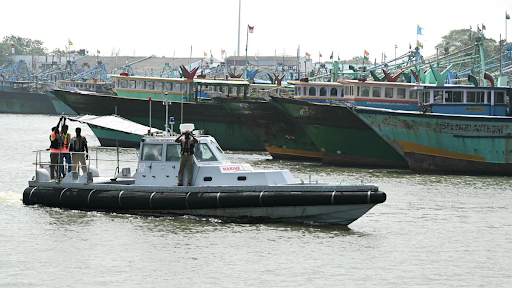




Disclaimer: Copyright infringement not intended.
India has tested a nuclear-capable ballistic missile with a range of around 3,500 km from a nuclear-powered submarine in the Bay of Bengal, in a major boost to its nuclear deterrence and strategic capabilities, people familiar with the matter.
|
Type |
Submarine-launched ballistic missile (SLBM): It is a ballistic missile capable of being launched from submarines. Modern variants usually deliver multiple independently targetable reentry vehicles (MIRVs), each of which carries a nuclear warhead and allows a single launched missile to strike several targets. Submarine-launched ballistic missiles operate in a different way from submarine-launched cruise missiles. |
|
Developer |
Defence Research and Development Organisation (DRDO). |
|
Range |
3,500 kilometers. |
|
Guidance System |
|
|
Engine |
The two-stage solid rocket motor. |
|
Propellant |
Solid rocket propellant. |
|
Key Feature |
Adaptation of the land-based Agni-III missile for submarine platforms. |
|
Significance |
Enhances India's strategic defense capabilities by enabling a credible second-strike option. |
It is an agency under the Department of Defence Research and Development in Ministry of Defence of the Government of India, charged with the military's research and development, headquartered in Delhi, India. It was formed in 1958 by the merger of the Technical Development Establishment and the Directorate of Technical Development and Production of the Indian Ordnance Factories with the Defence Science Organisation under the administration of Jawaharlal Nehru. Subsequently, Defence Research & Development Service (DRDS) was constituted in 1979 as a service of Group 'A' Officers / Scientists directly under the administrative control of the Ministry of Defence.
Read about
https://www.iasgyan.in/daily-current-affairs/ins-arighat
https://www.iasgyan.in/daily-current-affairs/india-launches-4th-ssbn
https://www.iasgyan.in/blogs/indian-missiles-an-overview
https://www.iasgyan.in/daily-current-affairs/new-generation-ballistic-missile-agni-prime
Source:
|
PRACTICE QUESTION Q.Consider the following statements about the K4 missile:
Which of the above statements is/are correct? (a) 1 and 3 only (b) 1, 3, and 4 only (c) 2, 3, and 4 only (d) 1, 2, 3, and 4 Answer: a Explanation: Statement 1 is correct: The K4 missile is an intermediate-range, nuclear-capable submarine-launched ballistic missile (SLBM) developed by India as part of its ballistic missile defense program. Statement 2 is incorrect: The K4 is designed to carry both conventional and nuclear warheads making it a versatile weapon in India's nuclear deterrence strategy. Statement 3 is correct: The missile has an approximate range of 3,500 kilometers and is designed for deployment on nuclear-powered submarines enhancing India’s second-strike capability in the event of a nuclear conflict. Statement 4 is incorrect: The K4 missile was developed by the Defence Research and Development Organisation (DRDO) not ISRO which is primarily responsible for India's space program. |





© 2025 iasgyan. All right reserved